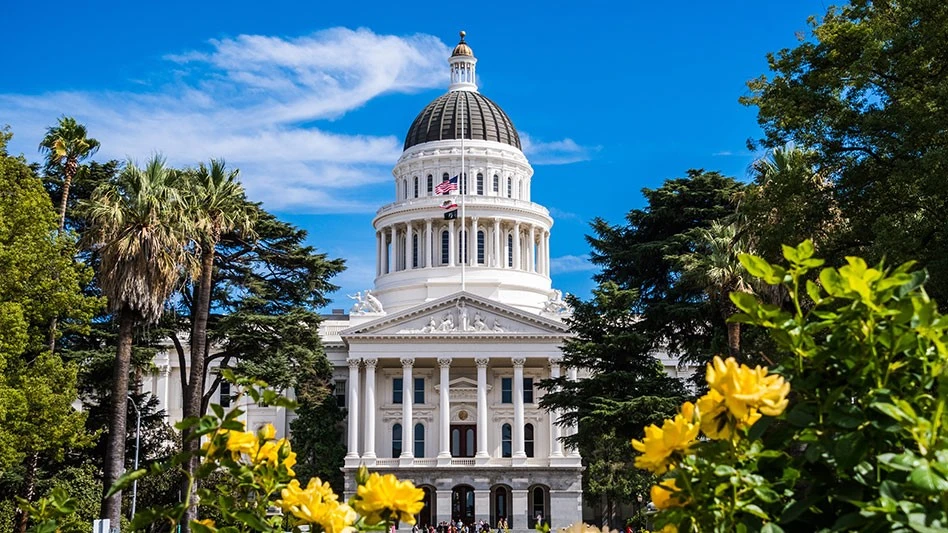
Sundry Photography | stock.adobe.com
As California’s 2022 legislative session drew to a close at the end of August, a number of recycling-related bills had passed the House and Senate and are awaiting Gov. Gavin Newsom’s signature.
S.B. 1013, sponsored by Sen. Toni Atkins, Sen. Bill Dodd, Rep. Jacqui Irwin and Rep. Philip Ting, all Democrats, expands California’s bottle bill to add a deposit to wine bottles and distilled spirit containers.
Atkins says, “S.B. 1013 is historic change that is 40 years in the making. I want to commend the wine industry, distilled spirits industry, environmental advocates and other groups who have come together to support this landmark proposal.”
S.B. 1013, if signed into law, would redefine “beverage” to include distilled spirits, wine or wine from which alcohol has been removed in whole or in part, including sparkling or carbonated versions. It would require distributors to pay a redemption payment for every beverage container sold or offered for sale in the state of 5 cents for those with a capacity of less than 24 fluid ounces and 10 cents for those with a capacity of 24 fluid ounces or more to the Department of Resources Recycling and Recovery (CalRecycle) and requires the department to deposit the funds into the California Beverage Container Recycling Fund. The act also requires those beverage containers to have a refund value of 5 cents and 10 cents, respectively, and to contain specified amounts of postconsumer recycled plastic content per year. The bill would require wine or distilled spirits that are packaged in a box, bladder, pouch or similar container to have a redemption payment and refund value of 25 cents and would grant an additional two years to comply with the act’s postconsumer recycled plastic content requirements.
The bill also would establish a Recycled Glass Processing Incentive Grant Program for applicants who demonstrate the ability to expand glass cullet processing in the state and can match or exceed the amount of the grant awarded.
A.B. 2784, which was introduced by Assemblymembers Ting and Irwin, would establish thermoform plastic minimum recycled content standards that start at 10 percent postconsumer thermoform recycled plastic by Jan. 1, 2025, and increase to no less than 20 percent or 30 percent postconsumer recycled content per year on or after July 1, 2030, depending on the recycling rate for the resin used to make the container.
S.B. 1046, introduced by Sens. Susan Talamantes Eggman and Lena Gonzalez, would ban plastic produce bags starting in 2025 and make it easier for consumers to tell the difference between compostable and noncompostable bags by no longer allowing green/brown tinting for noncompostable bags. This extends an earlier ban on plastic carryout bags that was enacted in late 2016.
S.B. 1215, introduced by Sen. Josh Newman, would add battery-embedded products to the Electronic Waste Recycling Act of 2003, expanding that program to cover new and refurbished products with nonremovable batteries and establishing an advanced disposal fee that consumers would pay beginning Jan. 1, 2026. Beginning Aug. 1, 2028, CalRecycle, in collaboration with the Department of Toxic Substances Control, could establish more than one covered electronic waste recycling fee for covered battery-embedded products based on categories of those products. The charge would be adjusted annually based on the California Consumer Price Index.
A.B. 2440, the Responsible Battery Recycling Act of 2022, introduced by Assemblymember Irwin, would establish a manufacturer-run stewardship program for alkaline and rechargeable batteries and require all retail chains that sell batteries to provide free collection for consumers.
Latest from Recycling Today
- BMW Group, Encory launch 'direct recycling’ of batteries
- Loom Carbon, RTI International partner to scale textile recycling technology
- Goodwill Industries of West Michigan, American Glass Mosaics partner to divert glass from landfill
- CARI forms federal advocacy partnership
- Monthly packaging papers shipments down in November
- STEEL Act aims to enhance trade enforcement to prevent dumping of steel in the US
- San Francisco schools introduce compostable lunch trays
- Aduro graduates from Shell GameChanger program





